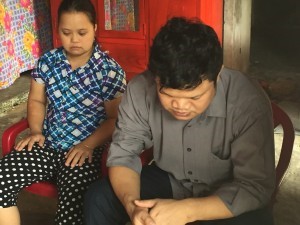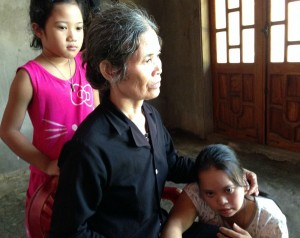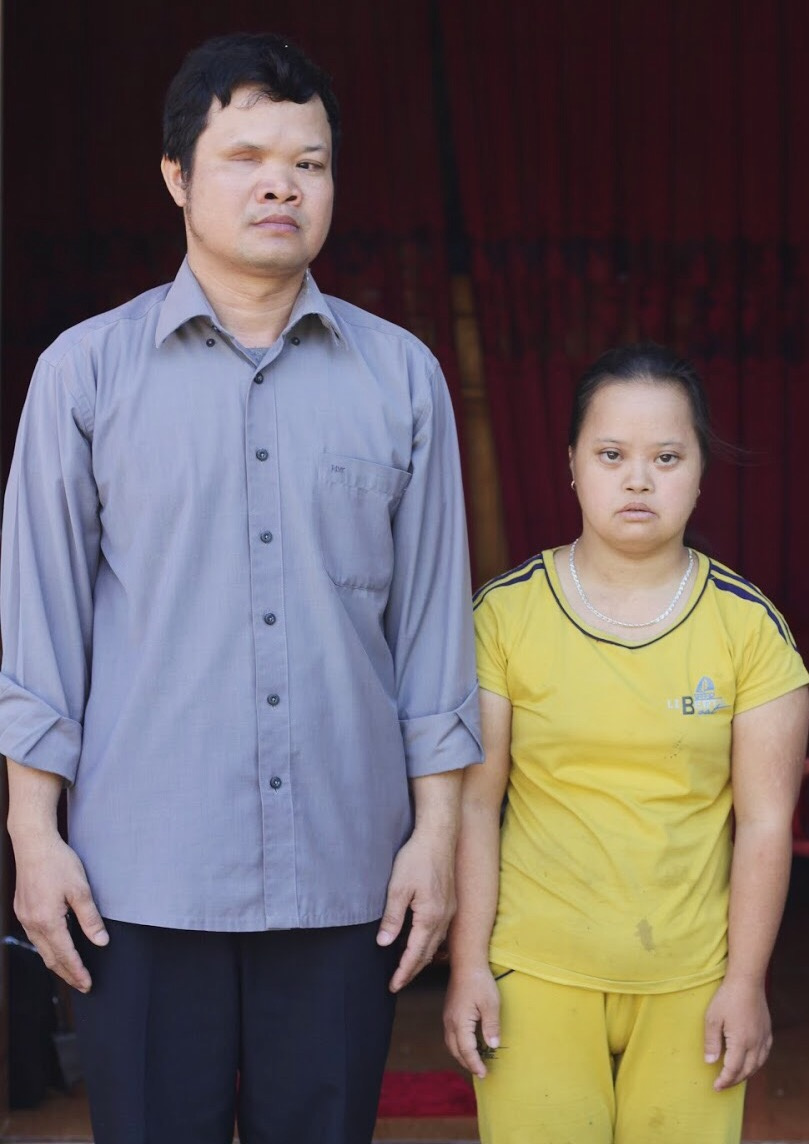Duong Thi An and Her Children
A family tries to cope with blindness
Profile by Jacob Cohn, July 2017
As we sit down with Mrs. An in her living room, we’re joined by her son Huong and her daughter Hoa, adults who still require their mother’s care due to the effects of Agent Orange. Mrs. An herself is in her sixties and seems melancholy and withdrawn—she speaks in a quiet voice I might struggle to follow even if I understood Vietnamese. It takes her a few minutes to respond to my first question about her first experience with Agent Orange, and as I wait for the translation I look around the living room; it’s dark and fairly spartan, with a prominently displayed certificate honoring the military service of Mrs. An’s late husband, Le Quoc Hung. Mrs. An tells me that her first exposure to Agent Orange occurred when her son Hoi, the first of three children, was born in 1976. Hoi’s father, Mrs. An’s husband Le Quoc Hung, had served in the North Vietnamese military during the American War and was exposed to Agent Orange in the late 1960s, while stationed in the forest around what was then the border between North and South Vietnam. As a result, Hoi was born with limited mental capacity, but he grew up to be functional enough to marry and start his own family; he now lives nearby, but a couple of his children scamper around the house during our talk. At one point, one of Hoi’s daughters brings another kid to gawk at the strange visitors—they peek at us over the fence as we continue our conversation. Mrs. An and Mr. Hung would have two more children before Mr. Hung’s death in 1981. The first, Huong (now 38), was born normal, but at age 9 his eyesight suddenly began to weaken, forcing doctors to remove his right eye. The youngest child and only daughter, Hoa (now 35) was born with Down syndrome and has never been able to go to school or grow into a functional adult. Mrs. An says that Hoa can only do simple household chores, but Huong was able to get a job as a masseur at a nearby massage parlor. However, his eyesight has been getting progressively worse since 2012 when he developed a detached retina in his remaining eye, forcing him to stop working.
The solution we’ve developed with Mrs. An’s help is to buy her family a buffalo, which Hoi and Huong will care for together. Mrs. An hopes to breed the buffalo and produce a calf that she can raise and sell—she can also use the buffalo for farm work, to generate fertilizer, and to rent out to other farmers in her area. Mrs. An seems dispirited for much of our visit, but she is noticeably optimistic about the possibility of improving her family’s status with a buffalo. She’s owned a buffalo in the past, she says, but had to sell it to pay for treatment for Huong; breeding her buffalo will allow her to build a more sustainable income, which she will use to buy much-needed food and medicine for Huong and Hoa. Mrs. An’s longer-term goal, she says, is a surgical procedure for Huong that could stop the decline of his vision. But this would involve a trip to the eye hospital in Hanoi (over 300 miles away) and a long-term stay so that doctors can monitor him; it would end up costing 50 to 70 million Vietnamese dong (around $2200 to $3000), which even with the buffalo is too much for them to afford. Mrs. An says that selling the calf, and possibly breeding the buffalo again, would help her eventually save enough money to afford the surgery for Huong. I ask Huong if there’s a deadline for the surgery, and he responds that he isn’t sure—but sooner would surely be better, while he still has eyesight left to preserve. Dat will eventually talk with me about some of the nuances of this part of the conversation that doesn’t get translated. As he will report, Mrs. An says that she’s offered to give Huong one of her own eyes in order to repair his sight, only to be told by doctors that this wasn’t possible. She then quotes a proverb that Dat has difficulty translating, but summarizes by saying that when you have a goal and there’s a 99% chance of failure, that still leaves a 1% chance of success. In other words, as long as there’s any chance at all of improving her children’s lives, she’ll sacrifice anything for them.
I ask about Hoa and whether there’s anything that can be done for her—Mrs. An tells me that there is no cure for her condition, but that medicine can at least make her life more bearable, and a buffalo would bring in the income necessary to buy the medicine Hoa needs. At this point, Huong adds that his ultimate dream, assuming he can retain some of his sight, is to open his own massage parlor and use his training to support himself and his family. This is well out of reach for them even with the buffalo, though, and medicine for Hoa and surgery for Huong is a much more immediate priority. Ngoc adds that this may eventually be something AEPD could help with, however. At this point, we all go outside to look at the animals Mrs. An has now. Next to the house is a wooden barn, which will be the home of the buffalo once it’s purchased, and the backyard includes a pond where dozens of ducks and geese live. It’s feeding time, and Mrs. An gently calls the birds to her. As she scatters food for them to eat, she tells me that her larger fear is that nobody will be able to take care of her children when she’s too old to provide for them and that she hopes someone can help her find a place for them after she dies. I can only tell her we’ll do our best, and that I hope we can raise the money for her new buffalo soon. Update by Karen Delaney, January 2018
Mrs. An has been using the buffalo for farming and plowing with the help of her eldest son, Le Quoc Hai (42) and his wife. She uses the fertilizer to grow food in her garden, which feeds her family. She welcomes us into her house and shows us the newly renovated floors Mrs. An’s three children and 2 grandchildren are affected by Agent Orange. While the oldest son doesn’t have any obvious disability and is able to work the field, he is intellectually disabled and was never able to study. His daughter, Le Thi Dieu Thuy (12) and son Le Quoc Hung (8) have the same symptoms as their father, and cannot concentrate in school. While Dieu receives 1.3 million dong per month as AO compensation, his two children do not because they are third-generation victims. His youngest son is only 2, so it’s too early to tell if he also suffers intellectually.
I ask them about surgery to fix his left eye, which is something they mentioned to AP before. They told me that according to the doctors, this surgery has only a 50% success rate. If It doesn’t go right, he goes blind, so the family does not want to take the risk for now. Mrs. An and the son tell us that although he has blurry vision and can only see up to three meters ahead, he can at least still see. In spite of his condition, his mom tells us that he is more confident now that he has a job. Huong seemed indeed in good spirit and was excited to tell us about his massage business! He has rented a room next to a hotel about 10 minutes from their house, where he works and sleeps. He cannot get there by himself, so he relies on neighbors to drive him Huong wants to expand his business, buy more equipment and hire staff. For now, he does all the work himself. The daughter, Le Thi Hoa (36), who has down syndrome, sits with us at the table quietly. When I asked about her, her mom tells me she understands us, talks and recognizes people. She also helps her mom cook and clean and washes clothes. When I asked about other symptoms, Mrs. An explains she just has “normal” illnesses like headaches and, the flu but is otherwise content.
Apart from getting benefits from the buffalo (rice and fertilizer for her garden), Mrs. An also raises chickens and pigs. Her eldest son, who helps her with farming, lives just next door. After thanking us again, Mrs. An shows us the animals at the back of her house. On our way out, we give Huong a ride to his massage center. When we arrive he shows us the facility, which has two large rooms, a kitchen, and a steam room. I ask Ngoc, AEPD’s translator if our support has helped the son develop his business and she says she hopes so. The income from the buffalo, she tells me, can certainly help him grow his business. When AEPD met this family, they connected Huong to the district’s “Association of Blind People”, which is where Huong received vocational training on massage. Ngoc tells me it is very common for the blind to be trained in massage to make a living. Update by Marcela De Campos, September 2018We visited Ms. An’s family earlier this month and spoke with Huong. Ms. An is in the hospital in Dong Hoi tending to serious problems with her gallbladder and elevated liver enzymes. Huong explained that no one realized Ms. An was sick, so she kept working in the fields and taking care of her children. He recalls that she worked so hard that her skin became yellow and eventually she could not eat anymore. Huong quietly and woefully mutters that they were all so focused on work, not health.
Ms. An has health insurance but it does not cover all the costs of her treatment. The family had to sell the buffalo calf to pay for her treatment in Hue. It helped cover the medical costs no money from the sale remains. On a positive note, Huong is happy to report that the buffalo has just conceived earlier this month and will bear a calf in approximately 10 months. They are maintaining their buffalo-rearing endeavor in the best way they can but are experiencing competing needs that surpass the income generated by it. Her eldest son, Le Quoc Hai, does not suffer from the effects of Agent Orange and is responsible for supporting the family in Ms. An’s temporary absence. Hai spends time with Ms. An in the hospital, uses the buffalo to farm sweet potatoes and vegetables, and raises pigs, ducks, and geese. Huong mentions that they depend on his Hai’s family. While Hai has taken up the farming and fieldwork duties, his wife has filled in for Ms. An inside the household. Ms. An taught Hoa how to do household chores but she often depends on someone to assist or task her which Hai’s wife is able to do. Beyond these interim household duties, she also goes to Ha Dinh province to purchase medicine for Huong and Hoa every month.
I left the visit feeling saddened by Ms. An’s health condition but inspired by her family’s strength, union, and compassion. The Campaign will continue to support Ms. An’s and Huong’s business plans with regular check-ins by the Outreach Workers and overall guidance.
Update by Mia Coward, August 2019 Ms. An continues to be a figure of strength despite her own health challenges Ms. Duong Thi An is my last visit. We visit her last because her son Huong had a checkup for his eyes in Ho Chi Minh City to see if he was eligible for surgery but unfortunately the chance that the surgery will work is still 50/50. As we get out of the car and walk toward the home, Ms. An’s daughter Hoa, who has down syndrome and is now 38 years old, greets us and opens the gate for us. She bows and we do the same. Her son Huong, who is 40 years old, can only see out of one eye. He comes out and welcomes us into the home. As he pours us some water, Ngoc introduces me and the Taiwanese interns. We begin with updates of the family. I am happy to see Ms. An since during our last visit she was in the hospital tending to a serious problem with her gallbladder. Now here with us, she is in better health but still has some stomach issues and has been to the hospital at least 6 times due to her vestibular disease. Because of the multiple hospital visits, Ms. An had to sell the baby buffalo for 8M VND. She also had to sell the pigs to cover the cost. She also borrowed money from neighbors or relatives but does not remember how much. Her daughter Hoa’s condition has had no change but still has regular check-ups when possible.  Ms. An with her daughter Hoa This year the mother buffalo gave birth to another baby buffalo who is now one month old. The buffalo is used only for fertilizer now because most people are using a machine for farming. Ms. An receives 900,000 VND for her daughter and 1,400,000 VND for her son from the government assistance for Agent Orange. She is unable to receive the caregiver assistance since she is taking care of the children and not the person directly affected. Her son Huong also makes about 40,000 VND per day from his massage business but has to pay about 1.2M per month for renting the space. Huong says for his business it is better if he has a partner working with him, he recently had a partner but he left and now he is back to working alone which leaves him at a disadvantage because when there are multiple customers he cannot serve them and that leaves him with less money and fewer customers. Ms. Ann and her son think that the loan program and the savings group could both be an interesting idea. Huong shares that if he could design a loan it would be for 100M VND with a 1-2M interest amount per year and a time length of 7-10 years for repayment. This type of loan would help him expand his massage business and get a partner, washer machine for his business and help his mother purchase some pigs. She would only raise mother pigs for breeding though so she can sell the piglets but not the ones for food since the pig disease could still kill the pigs and it could cost more. Ms. An and Huong also share that they would be willing to join a savings group and they could contribute about 150,000VND per month or 5,000 to 10,000 a day. However, they have some reservation, they would want to make sure that the procedures and policies fit there family and that others would be able to participate as well. It is very hard for families to participate in these type of programs because they have no way to have consistent work and there is no one in the household that can work a consistent job, most work on the land or have to take care of their children,leaving no spare time. They are not sure that a group of 10 Agent Orange victims would be good because they are also getting older and weaker and many will drop out or pass away.  It is good to hear that Ms. An’s family is in a more comfortable position to save money and plan for the future As we go to see the buffalo and new baby calf, Ms. An shows us where she plants the grass for the buffalo and some of her fruit trees, she also calls for some of the chicken and ducks who come walking around us. Ms. An says that last year they wanted to sell both buffalos but did not know if it was okay based on the business model they have but Ngoc (AEPD coordinator) assured them that if they need to in an emergency they are able to sell the buffalo. This family like all the families I have visited during my time in Vietnam are so resilient and continue to find ways to survive and provide for their family. |



















